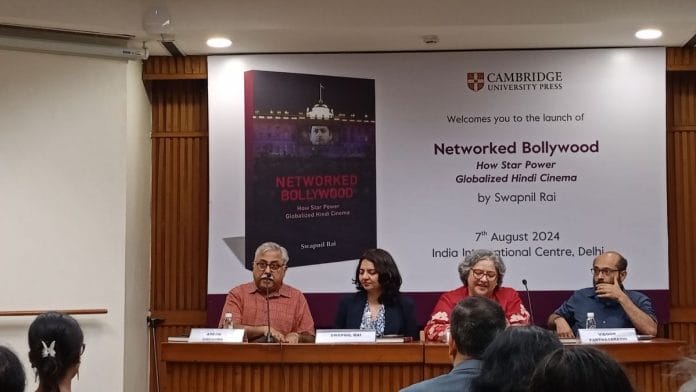New Delhi: Raj Kapoor, Amitabh Bachchan, Shah Rukh Khan and Aamir Khan have been able to leverage their star power to create business empires and influence diplomatic ties with other countries. But women stars have been conspicuously absent from the list.
“It is not like women weren’t big stars or that they did not have business ambitions, but they were not able to leverage their star power and set up business empires as the male stars,” said Swapnil Rai at the launch of her book, Networked Bollywood: How Star Power Globalized Bollywood Cinema. The book is both a business history of the industry and its globalisation. The launch at India International Centre (IIC) on a rainy evening of 7 August saw students turn up.
The panel discussion on star power and its global impact consisted of Rai, independent journalist and author Kaveree Bamzai, film journalist and author Aseem Chhabra, and associate professor at the Centre for Culture, Media and Governance, Jamia Millia Islamia, New Delhi Vibodh Parthasarathi. They all mentioned their favourite sections from the book and were especially intrigued by the gendered nature of star power in India.
Can actors famous on OTT platforms create their own empires? What made Raj Kapoor a bigger star and the Soviet Union’s darling, while Nargis couldn’t even get an escort to the airport there? Can Priyanka Chopra establish complete global dominion? These were a few questions the panellists discussed.
Shah Rukh Khan was recently given the Pardo Alla Carriera award at the Locarno Film Festival in Switzerland, the location for his iconic film, Dilwale Dulhania Le Jayenge (1995). It is just one of the places where the actor’s fan base has moved beyond NRIs. His other film My Name Is Khan (2010) was a runaway success in Eastern European countries such as Poland and Romania.
“Female fans play a big role in the popularity of Shah Rukh Khan and his presence in countries like Germany where they started a magazine dedicated to him, and now host a podcast and are stakeholders in screening his films,” said Rai.
Women icons now
What changed for women stars in the 2000s was the beauty pageant route into Bollywood. Swapnil Rai compared Aishwarya Rai’s journey to Priyanka Chopra’s, both of whom were outsiders and Miss World winners. While Rai’s journey was more of an individual attempt to take over the world, Chopra’s differed in being driven by agencies rather than just the actor.
“When Chopra left Bollywood, her acting skills were exceptional, and ABC network, which made her first global TV show Quantico, made sure that she was on every magazine cover and talk show. If you stopped any random person in the US and asked them if they know an Indian actor, they only know her,” said Chhabra. He also mentioned how her marriage to American singer-songwriter Nick Jonas solidified her grip on the global scene.
An audience member suggested that women actors might have faced stumbling blocks because not enough iconic roles were written for them.
He pointed out that the only actor in recent times with commercial hits and critical acclaim in equal measure is Alia Bhatt.
Bhatt has managed to leverage her star power. She has also diversified her career, in terms of roles, as a producer, director and business person.
“I want to include Taapsee Pannu and Kangana Ranaut because they are trying to establish themselves locally, if not globally, not just as players in someone’s story,” said Bamzai.
Also read: IVF, adoption, single parenthood—3 ‘unconventional’ mothers discuss who ‘good’ & ‘bad’ moms are
Movie stars and diplomacy
Women actors were never taken seriously in India. Bamzai talked about how they were portrayed by the press. “Raveena Tandon once told me that female journalists of her time were very mean to the heroines because they were in love with the heroes. And they always pitted female stars against each other,” added Bamzai.
Bamzai then mentioned another actor, Juhi Chawla, who was part of Dreamz Unlimited production house, Shah Rukh Khan’s business venture. “Juhi Chawla was always projected as a giggly, lightweight individual,” said Bamzai.
But it all started back in the day with Nargis, who was also Raj Kapoor’s girlfriend. “Nargis was a silent partner in RK Films but was never acknowledged as one of its investors. She never got legitimacy in the film industry,” said Bamzai.
She read out a passage from the book in which Rai describes the role of Raj Kapoor in India-Soviet diplomacy. Despite being the lead of Pardesi (1993), the first India-Soviet co-production, Nargis never quite managed to make inroads into the movie business or gain diplomatic attention. The only woman, until Alia Bhatt and Priyanka Chopra now, who enjoyed star power on par with male actors was Devika Rani—she was related to Rabindranath Tagore, and had studied abroad.
Rai said the promotion of Kapoor’s films was also spearheaded by former Prime Minister Jawaharlal Nehru. Business strategies like converting three-hour-long films into an episodic format were used to sell them better in the Soviet Union, which contributed to Kapoor’s popularity there. Apparently, it was former Premier of the Soviet Union Joseph Stalin who told Nehru about Awaara (1951).
Raj Kapoor’s family connections also helped his case. His father Prithviraj Kapoor was a prominent actor, founder of Prithvi Theatre and a nominated Rajya Sabha MP.
“The Hindujas distributed Sangam in Iran, and Awaara was extremely popular in Soviet, and I have even found Turkish posters of Awaara, and coffee coasters of it in Spanish,” said Chhabra.
It opened pathways for other actors such as Amitabh Bachchan and Shah Rukh Khan and now Priyanka Chopra.
The discussion took a break from the big screen when an audience member asked if the streaming platforms could become the space for movie stars to shine.
“But would you call Pankaj Tripathi a star, or an actor? There is no stardom of a certain kind now,” said Rai.
(Edited by Ratan Priya)






